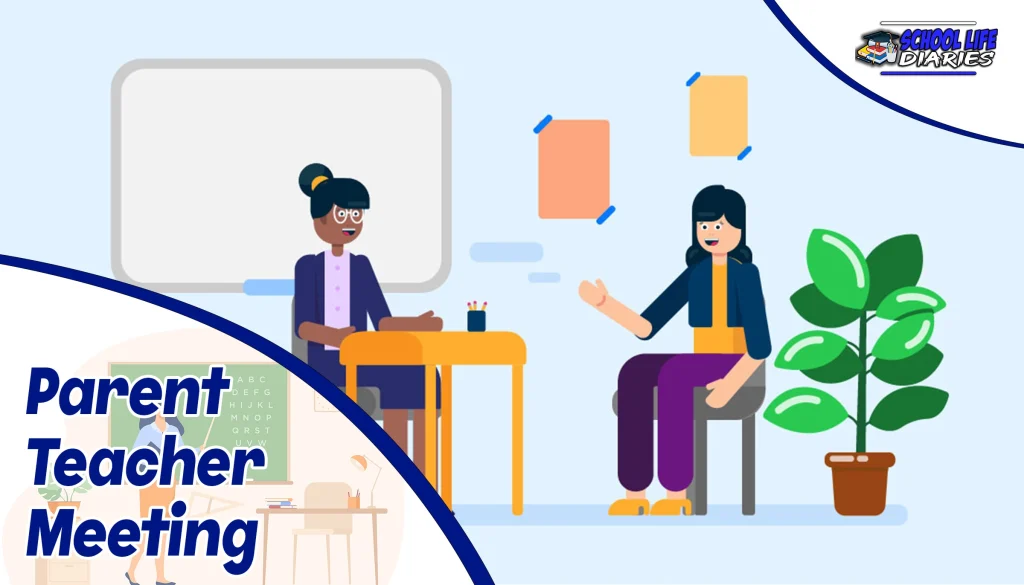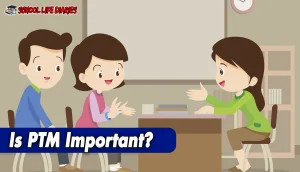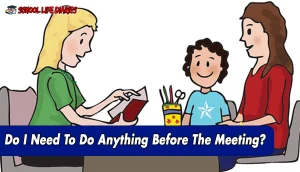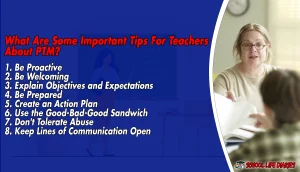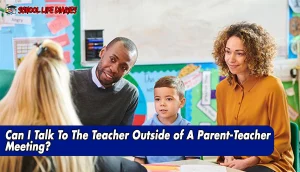Parent-teacher meeting (PTM) are an essential aspect of a child’s education. These meetings provide teachers with the opportunity to communicate with parents about their child’s academic progress, behavior, and any concerns that may arise.
PTMs allow teachers to work together with parents to ensure that the child is receiving the best possible education. While PTMs can be time-consuming and demanding for both teachers and parents, they offer numerous benefits that cannot be overlooked.
By attending PTMs, parents can gain insight into their child’s academic strengths and weaknesses, allowing them to support their child at home effectively. Teachers can also use these meetings as an opportunity to learn more about each student in their class on a personal level, which can help them tailor their teaching approach to meet individual needs.
What is PTM?
The Parent-Teacher Meeting (PTM) is a scheduled event that takes place at schools, usually once or twice a year. During this meeting, teachers and parents come together to discuss the academic progress and behavior of their children without any biases or personal opinions.
The main purpose of PTM is to establish open communication between the two parties, which helps in building trust and understanding. One of the biggest benefits of PTM is that it provides an opportunity for parents to get involved in their child’s education.
When parents attend these meetings, they can better understand their child’s strengths and weaknesses and how they can support them at home. This involvement also leads to higher levels of student achievement as students feel supported by both their teachers and parents.
To make the most out of PTMs, both teachers and parents need to prepare well in advance. Teachers should have a clear idea about each student’s progress so far, including areas where they need improvement. Parents should have clear expectations from these meetings regarding what they want to achieve through this discussion with the teacher.
PTMs are an essential part of a student’s academic journey as it facilitates healthy communication between teachers and parents. Through preparation and effective communication during these meetings, parents become more involved in their child’s education while also gaining insight into areas where they can provide additional support at home.
Is PTM Important?
The significance of parent-teacher meeting cannot be overstated as it provides a platform for sharing information and fostering positive relationships between stakeholders in a child’s education. PTMs are important because they give parents an opportunity to meet their children’s teachers, discuss student progress, and learn more about what is happening in the classroom.
This interaction allows teachers to share information with parents on how they can support their children at home. One of the benefits of parent-teacher meetings is that it helps to improve student progress by allowing teachers to identify areas where students may need extra help or attention.
What Are Some Tips For Teachers In PTM?
Effective communication strategies are crucial for fostering a positive and supportive environment during parent-teacher conferences, ultimately leading to improved student outcomes. Teachers should be prepared with an agenda that outlines the topics to be discussed during the meeting.
This helps both parties stay focused and ensures that important issues are not overlooked. Active listening is another key component of effective communication during PTM. Teachers should listen attentively to parents’ concerns and questions, and provide thoughtful responses.
Constructive feedback should also be given in a respectful manner, highlighting areas of strength as well as opportunities for improvement. Follow-up actions are necessary to ensure that any agreements or action plans made during the PTM are carried out.
Both teachers and parents should have a clear understanding of what needs to happen next, whether it involves additional meetings or specific actions taken by either party. By following through on these commitments, trust can be built between parents and teachers, leading to stronger relationships and better outcomes for students.
Do I Need To Do Anything Before The Meeting?
Prior preparation is necessary for a productive and successful parent-teacher conference. Teachers should take the time to plan their agenda, organize their thoughts, and gather materials that they may need during the meeting. Preparation tips can include reviewing student work or progress reports beforehand, creating a list of talking points, and considering questions or concerns that parents may have.
By putting in this extra effort before the conference, teachers can ensure that they are well-equipped to communicate effectively with parents. Communication strategies are also crucial for a successful PTM. Teachers should try to establish a positive and welcoming atmosphere from the outset by greeting parents warmly and inviting them to share their own insights about their child’s learning.
Active listening skills are essential throughout the conference, as teachers should be attentive to parent feedback and respond thoughtfully. Encouraging parent involvement in goal-setting or action planning can help foster collaboration between home and school to support student success. Following up with parents after the meeting via email or phone call can help keep communication lines open and reinforce any agreed-upon next steps.
By taking these additional steps beyond just having a conversation during PTM, teachers can build stronger relationships with parents and keep students on track toward achieving academic success.
What Should I Do If I Can’t Attend A Scheduled Parent-Teacher Conference?
In the event that an individual is unable to attend a scheduled parent-teacher conference, it is important to communicate with the school and explore alternative options for engaging in productive discussions about their child’s academic progress. Rescheduling options may be available, depending on the policies of the school and the availability of both parties involved.
It is crucial to inform the school as soon as possible if attendance cannot be confirmed or if there is a need for rescheduling. Communication alternatives can also be considered if attending physicals at school is not feasible. Virtual conferences are becoming more popular nowadays due to technological advancements that make it easier for people from different locations to communicate with each other in real time.
Schools may offer virtual conferencing services or recommend third-party applications that facilitate video conferencing, such as Zoom or Google Meet. Proxy attendees can also be considered, especially in cases where parents have pressing engagements but still want someone else who could represent them during meetings with teachers. This option must involve prior consent from both parties involved and should only be utilized when necessary.
Should I Talk To My Child About What The Teacher Said?
Discussing the teacher’s feedback with one’s child is an important aspect of parent involvement in their child’s academic success. Communication strategies between parents and teachers can be enhanced by active listening and open dialogue. By talking to their child about what the teacher said, parents can gain a better understanding of their child’s strengths and weaknesses, as well as any areas that require improvement.
It is essential for parents to approach these conversations in a positive and constructive manner. Parents should listen actively to their child’s perspective on the feedback provided by the teacher, acknowledging any concerns or questions they may have. This type of communication fosters a sense of collaboration between all parties involved and promotes a more positive learning environment for the student.
Discussing teacher feedback with one’s child has numerous benefits for both parties involved. It allows for open communication channels between parents, students, and teachers while promoting a collaborative approach toward achieving academic success. By using effective communication strategies such as active listening and constructive dialogue, parents can help facilitate productive discussions with their children that ultimately lead to improved educational outcomes.
What Are Some Important Tips For Teachers About PTM?
In order to ensure a successful Parent-Teacher Meeting (PTM), there are certain important tips that teachers should keep in mind. Firstly, being proactive is crucial when it comes to scheduling and organizing the meeting. Teachers should also be welcoming and create a comfortable environment for parents to discuss their child’s progress.
It is equally important for teachers to explain the objectives and expectations of the meeting beforehand, be prepared with relevant information, and create an action plan for addressing any concerns or issues raised by parents.
1. Be Proactive:
To effectively address potential issues, being proactive in teacher meetings with parents is crucial. Teachers who adopt a proactive approach are able to foster effective communication and build positive relationships with parents. This requires a positive attitude towards parent involvement and problem-solving strategies that can help prevent issues from escalating.
Being proactive means anticipating potential problems before they arise, and taking steps to address them proactively. This includes scheduling regular meetings with parents to discuss their child’s progress and any concerns they may have. It also involves creating a safe space for open dialogue where both parties can share their thoughts and ideas without judgment or fear of retribution.
2. Be Welcoming:
Having a proactive approach is crucial in ensuring the success of any teacher-parent meeting. However, being proactive alone may not be enough to establish a comfortable and productive environment for both parties. That’s where being welcoming comes into play.
Open communication is key to building positive relationships between teachers and parents. As such, it’s important for educators to greet parents with warm greetings and maintain a positive attitude throughout the meeting. Creating a welcoming environment can also help foster trust between teachers and parents, which can lead to more productive outcomes for students.
3. Explain Objectives and Expectations:
Establishing clear objectives and expectations is crucial for creating a productive and effective teacher-parent meeting. Teachers must ensure that they communicate their goals, strategies, and priorities to the parents in order to foster mutual understanding and collaboration. By setting realistic and specific objectives, teachers can manage parental expectations effectively, which helps them avoid misunderstandings and conflicts.
Teachers should provide regular updates on the academic progress of their students and solicit feedback from parents on how they can improve their teaching methods. This approach creates a sense of partnership between teachers and parents, leading to more positive outcomes for students in terms of academic success.
4. Be Prepared:
Having explained the objectives and expectations of a teacher meeting with parents, it is essential to highlight the importance of being prepared. As a teacher, preparation tips are your best friend when it comes to engaging effectively with parents. The success of any meeting lies in effective communication strategies, presentation skills, time management, and active listening.
To be adequately prepared for these meetings, you must have all relevant information about the student at your fingertips. This includes academic performance reports, behavioral records, and any other relevant information that can help you provide accurate feedback to concerned parents.
5. Create an Action Plan:
Developing an action plan is crucial for ensuring productive teacher-parent interactions and achieving desired outcomes. A well-crafted action plan can help establish clear expectations, facilitate effective communication, and ensure that both parents and teachers are working towards the same goals.
One of the key components of an action plan is a communication strategy that outlines how information will be shared between teachers and parents. This can involve regular progress reports, emails, or phone calls to discuss concerns or successes, or even parent-teacher conferences.
6. Use the Good-Bad-Good Sandwich:
Utilizing the good-bad-good sandwich technique can be an effective way to deliver constructive feedback during teacher-parent interactions. Effective communication is essential in fostering a positive relationship between teachers and parents, especially when it comes to discussing the progress of their children.
The good-bad-good sandwich method involves starting with a positive comment, followed by constructive criticism, and ending with another positive comment. This balanced approach ensures that the parent receives both positive feedback and areas for improvement in a manner that is not too harsh or critical.
7. Don’t Tolerate Abuse:
Abuse prevention should be a top priority in any educational setting, and this includes when teachers meet with parents. It is important for teachers to set clear boundaries and communicate effectively with parents to ensure that the meeting remains productive and respectful.
Teachers should also have strategies in place to address any abusive behavior from parents, including reporting incidents to school administration or law enforcement if necessary.
8. Keep Lines of Communication Open:
Maintaining open lines of communication in educational settings fosters a collaborative environment that encourages active participation and engagement. Effective communication between teachers and parents is crucial in promoting student success. Parents who are involved in their child’s education tend to have a better understanding of their child’s academic strengths and weaknesses, as well as any issues that may be affecting their learning experience.
Building relationships with parents through open communication can also lead to improved trust and respect between teachers and families. Active listening is an important aspect of communication, allowing both parties to express their thoughts and concerns without interruption or judgment.
How Can I Provide Feedback and Updates To Parents Throughout The School Year?
One effective way to keep parents informed of their child’s progress throughout the school year is by regularly sharing updates on academic performance and behavioral developments. Progress tracking can be done through online platforms where parents can log in and view their child’s grades, attendance, and other important information.
This allows for transparency and encourages parent involvement in their child’s education. Regular updates on behavior can also be shared through communication channels such as emails or phone calls. It is important to note that providing regular feedback not only benefits parents but also supports student success.
When parents are aware of their child’s progress, they can offer additional support at home or communicate with teachers about any concerns they may have. By keeping lines of communication open between teachers and parents, a collaborative effort can be made to ensure each student reaches their full potential.
Can I Talk To The Teacher Outside of A Parent-Teacher Meeting?
Engaging in communication with educators beyond scheduled parent-teacher conferences can foster a deeper understanding and connection between families and schools, ultimately leading to improved student outcomes. Teacher accessibility is one major issue that parents may encounter; some teachers may not have the time or resources necessary to engage in frequent communication outside of their designated office hours.
Scheduling conflicts may also pose a challenge for both parties; teachers have busy schedules that often include extracurricular activities or administrative duties, while parents may find it difficult to schedule time outside of work hours. Alternative communication options can help alleviate some of these challenges.
For example, many schools now offer online portals where parents can access their child’s grades and assignments or communicate with teachers through private messaging systems. This allows for secure and convenient communication at any time without the need for scheduling conflicts or privacy concerns.
Conclusion:
Parent-teacher meeting (PTM) are essential for fostering a healthy and productive academic environment. Teachers can use PTMs to provide valuable feedback to parents about their child’s performance in school, while also receiving important insights from parents that can inform their teaching strategies.
Preparation is key for both teachers and parents before the meeting, so as to ensure that the conversation is focused and productive. During PTMs, teachers should keep an open mind, maintain a positive attitude, and be prepared to listen actively and respond thoughtfully to parental concerns.

